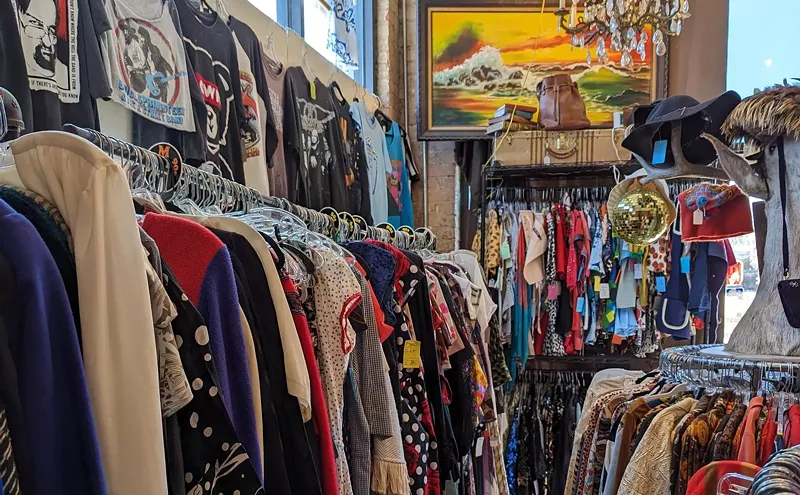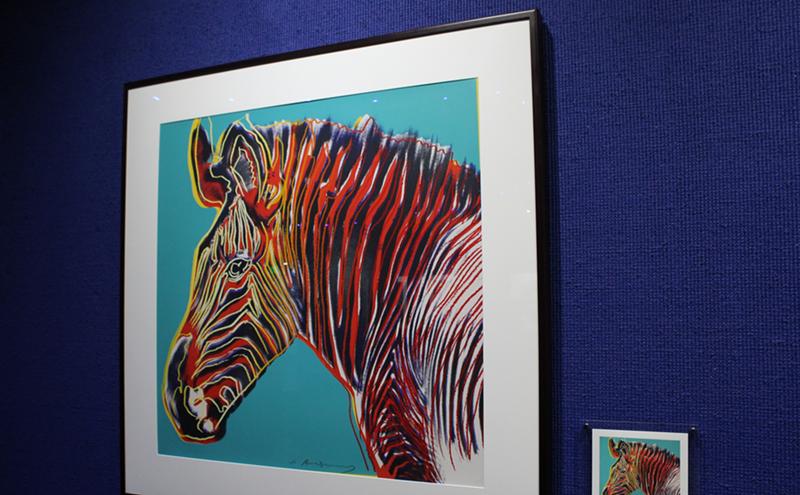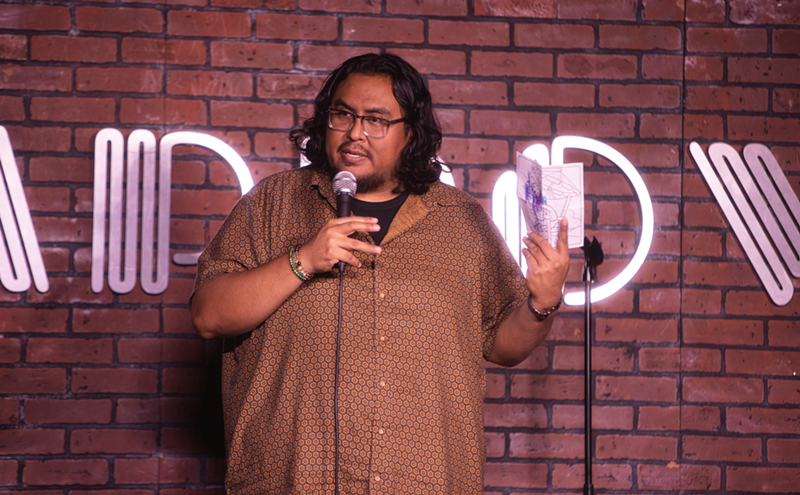Heard a story once about Niccolo Paginini, the Italian violin prodigy who suffered from a grab-bag of maladies, that when his teeth began to fall out he'd use violin strings to hold them together. The point: there is no musician more epic than a dedicated violinist.
So, to those who're holding to their teeth together with instrument strings (and any one else that likes really-cool-priceless-stuffs):
A just-in press release tells us: The Fort Worth Symphony Orchestra has picked up a second, badass Stradivarius Violin. This second one, which has been dubbed the "Eugenie" according to the release, will be played by Associate Concertmaster (a title we'd like to have here at the office) Swang Lin at upcoming FWSO shows.
If anyone's thinking, "whoopdee doo," here's why this is cool:
1. The "Eugenie" Stradivarius was created in Cremona, Italy in the year 1685. Which is really old. 2. There are only 650 known Stradivari in the world. And we have two. 3. If you come to the Fort Worth Symphony at sunset, visitors will be able to play "Stairway to Heaven" on the Stradivarius for free.
OK, that last one isn't true, but you get my point. Full release is after the jump.
FORT WORTH -- The Fort Worth Symphony Orchestra is pleased to announce that it has acquired a second rare violin by Antonio Stradivari. On loan to the orchestra by a generous Fort Worth patron who has asked to remain anonymous, it a well-known instrument dating from 1685 that has for decades been called the "Mackenzie" Stradivarius. On the occasion of this gift to the Fort Worth community, the violin has been renamed the "Eugenie, ex-Mackenzie."The "Eugenie" Strad will be played by Associate Concertmaster Swang Lin at Fort Worth Symphony Orchestra concerts. (FWSO concertmaster Michael Shih has long performed on the 1710 Davis Strad.) With today's announcement, the Fort Worth Symphony becomes one of a very small number of U.S. orchestras with more than one violin by the most esteemed maker in history.
The 'Eugenie' Strad
The "Eugenie" Strad was created by Antonio Stradivari in 1685 in Cremona, Italy, when the famed violin maker was 41 years old. Stradivari crafted instruments that are still considered to be the finest ever made. The new styles of violins and cellos that he created were remarkable for their excellent tonal quality and became the basic design for all modern versions of the instruments. The sound of these violins resonates beautifully and produces very powerful tones. No one knows exactly why the sound of the Stradivari is so wonderful, but there are many theories. The quality of the wood is a definite factor, as well as the shape of the instrument, the thickness of the wooden plates that are placed in the belly and the back of the instrument, and the varnish on the wood. Of the more than 1,100 instruments Stradivari made, only 650 are known to survive today.
The Eugenie, whose finish is a light honey color, is fully restored and in top shape. It was the cover and "centerfold" of Strad magazine in March 1982. Previous owners include noted Beverly Hills instrument collector Nathan Posner and American violinist Raymond Cerf. It was most recently on loan to Emanuel Borok of the Dallas Symphony Orchestra during the period before the DSO's stolen Stradivarius was recovered. Before that, it was on loan once before to the Fort Worth Symphony Orchestra in the 1980s. The FWSO even celebrated the violin's 300th anniversary at a party at the Fort Worth Club in 1985.
Swang Lin and Michael Shih: Two Strads are better than one
Associate Concertmaster Swang Lin and Concertmaster Michael Shih attended the same elementary school in Taiwan, though they did not know each other. Now, halfway around the world, they've found themselves playing side-by-side at the head of the Fort Worth Symphony's violin section, and now both are playing Strads.
Both players, especially Lin, have had time to compare the two instruments. "Each is unique and special," says Shih. Swang Lin, who also got to play the 1710 Davis Strad during the three years he was acting concertmaster prior to Shih's appointment, observes that the sound of his new instrument, the 1685 Eugenie Strad, is somehow "more feminine."
For the Fort Worth Symphony Orchestra, having one Stradivarius violin on loan has attracted some of the nation's top musicians to the position of concertmaster. Having two Strads will further enhance FWSO's reputation as well as the already rich tone quality of its string section.
Hear the FWSO's two Strads
The next chance is three classical performances this weekend, Nov. 18-20, with guest conductor Rossen Milanov leading Rachmaninoff's Symphony No. 2, the Richard Strauss' Horn Concerto No. 1 and John Adams' The Chairman Dances.
In February 2012, Shih and Lin will perform on the Strads as soloists in the Bach Concerto for Two Violins at a community concert at Arborlawn United Methodist Church in Fort Worth.
Swang Lin's bio
Swang Lin joined the Fort Worth Symphony Orchestra in 1991 and was appointed associate concertmaster a few years later. He served as acting concertmaster from 1998 to 2001. Before joining the FWSO, he performed with the Orpheus Chamber Orchestra and the Orchestra of St. Luke's in New York and in concert halls across the United States and Europe, including Royal Albert Hall, Carnegie Hall, Avery Fisher Hall, and the Kennedy Center for the Performing Arts. He has held concertmaster positions with the West Virginia Symphony Orchestra, Taipei City Symphony Orchestra, and Bear Valley Festival Orchestra. He also has served as a faculty member and performing artist for festivals including Tanglewood, Caramoor, Colorado, Utah, and BBC Proms.
A frequent soloist with the Fort Worth Symphony Orchestra, Swang has also been a soloist with the West Virginia Symphony Orchestra, Kaohsiung City Symphony Orchestra (Taiwan), Shanghai Broadcast Symphony Orchestra, Kunming Symphony (China), and Taipei City Symphony Orchestra, among other ensembles. His performances have been heard on National Public Radio's Performance Today program and broadcast on Good Morning America and on public television.
An active proponent of chamber music, he has performed with the Fine Arts Chamber Players of Dallas, Chamber Music Society of Fort Worth, Spectrum Chamber Music Society, Basically Beethoven, and Snowbird Institute String Chamber Music Festival, and participated in several faculty concerts at TCU.
A native of Taipei, Taiwan, Swang began studying the violin at age six. He earned his bachelor's and master's degrees in violin performance from the Eastman School of Music under the instruction of Zvi Zeiltin. His other teachers include Naoko Tanaka, Chong-Ping Hsieh, and Hsing-Cheng Si-Tu.
Swang resides in Euless with his lovely wife, Amy, and their two cats, Misha and Pinky.
He plays the "Eugenie, ex-Mackenzie" Antonio Stradivari violin (1685), generously on loan to the Fort Worth Symphony Orchestra Association from an anonymous local patron.












